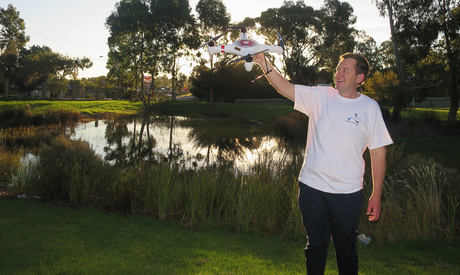Like a drone over troubled water

Start-up company Drones Over Water, founded in 2015 by Adelaide entrepreneur Dan Squire, is developing drones to collect and test potentially dangerous water samples from dangerous or difficult-to-access environments such as reservoirs, chemical spills, wastewater plants, tailings dams and ocean oil spills.
The drones are capable of flying — either autonomously or with the help of a pilot — to a programmed GPS position and collecting a sample from a specific depth, using an attachment that hangs below the drone. Squire explained, “When you lower it to a certain level the attachment opens up, takes a water sample at that level, it closes and flies the sample back.”
The drone can test the sample on board or a variety of parameters, including temperature, pH, conductivity and redox. This data can be sent to the people who need it.
“At the moment we just save it on an SD card, but in the future, either through Wi-Fi or a 3G connection, we’ll be able to send it straight to the cloud and someone can access it basically as it’s happening,” Squire said.
Squire last year won first prize at the Flinders University New Venture Institute eNVIes awards. His prize included a $5000 travel scholarship to Austin, Texas, which he plans to use to pitch his idea to potential investors or business partners. If an investor is found in the coming months, Squire aims to launch a product before the end of the year and possibly offer a service even sooner.
“I think the water industry is going to be our main customer, followed by probably environmental, mining and also emergency, such as for a chemical spill or a spill on the ocean where you can’t put people’s lives at risk to go out and monitor that water if it is dangerous,” he said.
“A the end of the day, there’s no-one standing on the edge of a boat or on the edge of the water to be endangered. You can also go out to watercourses that people can’t go out on, like in the mines.”
Chewing gum can shed microplastics into saliva, study finds
Most of the microplastics detached from gum within the first two minutes of chewing, with the act...
Widespread applications of shake flask off-gas analysis across biotechnology
Despite the emergence of more sophisticated bioreactor systems, shake flasks continue to play a...
Scientists may finally know what makes Mars red
The water-rich iron mineral ferrihydrite may be the main culprit behind Mars's reddish dust,...




